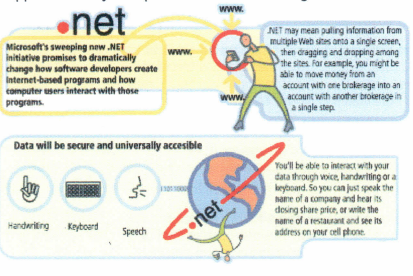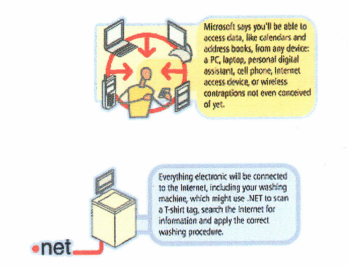Five months into a long-term undertaking that Microsoft expects to radically transform how software is used, the complex effort is beginning to gain support from key constituencies.
Called .NET, the initiative is in part a strategy shift that emphasizes the Internet and smaller computing devices as heavily as the personal computer. It’s also partly marketing hype, admittedly murky concepts, and a buzzword that gets slapped onto any new piece of software coming out of Redmond.

Yet several area companies, mostly longtime Microsoft customers, have said they will use .NET or are already doing so. These include Seattle’s digiMine and Aptimus Network and Bellevue’s Onyx Software.
Microsoft says software developers numbering in the “low hundreds of thousands” are using an experimental version of .NET software tools. A regional software-development leader concurs that developers – the group most essential to project’s success – are moving to embrace.NET. Unlike most past Microsoft undertakings, .NET is based on emerging Internet standards rather than proprietary technology.
The approach envisions a very different future for software developers and users, one based more on Web services – mini-programs out on the Internet – than on conventional programs running on PCs.
Its success is critical for the 25-year-old-company, which faces slowing growth in the PC market and increasingly tough competition from Oracle and Sun Microsystems.

“It’s very fundamental. .Net is our delivery vehicle for what we think of as the next generation of the Internet,” said Charles Firzgerals, the initiative’s director of business development.
Microsoft, the world’s largest software market, is sparing no effort to ensure .Net succeeds. Co-founder Bill Gates, whose vision has already transformed the computing world, stepped down as chief executive officer in August to head .NET as chief software architect. The company will piur hald its annual $4 billion R&D budget into .NET for several years.
For computer users, Microsoft says, .Net will mean the ability to pull information and programs from multiple Web sites onto a single screen, where they can be combined and manipulated.
It will mean accessing data, like calendars and address books, from any device: a PC, laptop, personal digital assistant, cell phone, internet-access device, or contraptions not even conceived of yet. Data will automatically appear in the proper format, with or without graphics as appropriate for the device.
And it will mean that, rather than buying programs on CDs and installing them on your PC, you’ll rent them over the Internet in a new business model called subscription, storing your data online and paying Microsoft monthly usage fees.
Businesses will be able to bid for suppliers, order parts, and exchange purchase orders and invoices with other companies that use different computer systems and programs.
.NET’s success depends on whether Microsoft has correctly divined where computing is headed. It will also turn on whether Microsoft can execute its vision to rework every piece of software it produces, and whether it can persuade sufficient numbers of developers to embrace the new venture.
Many analysts and observers found the initial announcement of .NET in June puzzling. Even Microsoft concedes the scheme is hard to grasp.
“The problem with the .NET vision is it’s far-reaching,” said Barry Goffe, a .NET group product manager. “It has led to a fair amount of confusion about what it is and how it’s going to affect people.”
Yet a number of industry watchers now say they understand .NET – and they believe it’s the right path for Microsoft to take into the Internet-centric new millennium.
“For now, .NET is still more marketing than substance,” said Rob Enderle, an analyst with Giga Information Group. “But in two to three years, it will be marketing and substance. And it will change everything in the firm.”
Cameron Myhrvold, a former Microsoft executive, said he thinks Microsoft is one of the few companies that can pull off a project as sweeping as .NET.
“Microsoft understands as well as anyone, if not better, how to create opportunities for partners by getting them invested in Microsoft’s success,” Myhrvold said.
Bassel Ojjeh, chief operating officer at Kirkland start-up digiMine Inc., saif the XML basis of .NET has already simplified exchanging data with client companies. DigiMine analyzes companies’ Web traffic for unsuspected patterns through technology known as data mining.
“Everyone is going all over the board on what .NET means,” Ojjeh said. “For me it’s simple: It’s a beautiful story of how they enabled me to run my business.”
Most onlookers seem to feel that, confusing and grandiose though it may be, Microsoft’s .NET initiative has a future.
“All the I’s aren’t dotted and the t’s are crossed, but remember back to 1994, when people said everything’s going to Internet-enabled – no one knew what to expect,” said Dwight Davis, an analyst with Summit Strategies. “Most is saying the world will be wonderful, but it’s not clear just how yet.”
Financial analysts seem neutral on .NET. Overall, rating of Microsoft by the 21 analysts who follow the company have remain unchanged since June, when .NET debuted. Six of them give Microsoft their highest ratings, 13 their second highest.
If no one else is sure .NET will succeed, Microsoft is.
“Microsoft didn’t invent Web services,” said Neil Charney, a .NET group product manager. “We just recognized they’d change how the world works. It’s an exciting time to be at Microsoft.”
By: Dan Richman
Source: SEATTLE POST-INTELLIGENCER
